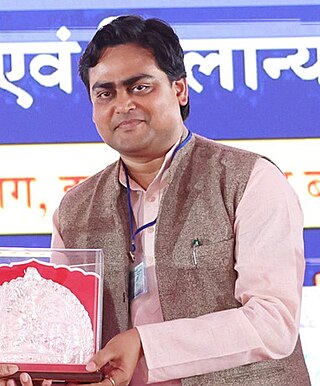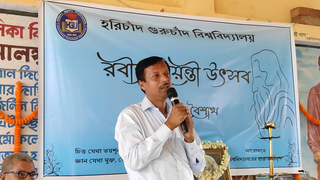Namasudra, earlier known as Chandal, is an Avarna Bengali Hindu community originating from eastern and central Bengal. The term Chandal or Chandala is usually considered as a slur. They were traditionally engaged in fishing and as boatmen, and later in cultivation. They lived outside the four-tier ritual varna system and thus were outcastes.
Das is a common last name in South Asia, among adherents of Hinduism and Sikhism, as well as those who converted to Islam or Christianity. It is a derived from the Sanskrit word Dasa meaning servant, devotee, or votary. "Das" may be inferred to be one who has surrendered to God. The surname is often used by those in the Vaishnav community.
Bahujan is a Pali term frequently found in Buddhist texts, with a literal meaning of "the many", or "the majority". In a modern context, it refers to the combined population of the Scheduled Castes, Scheduled Tribes, Other Backward Classes, Muslims, and minorities, who together constitute the demographic majority of India. The word bahujan appears in the dictum "Bahujana sukhaya bahujana hitaya cha", articulated by Gautama Buddha.
Mahishya is a Bengali Hindu traditionally agrarian caste, and formed the largest caste in undivided Bengal. Mahisyas were, and still are, extremely diverse caste consisting of all possible classes in terms of material conditions and ranks.

Thakurnagar is a village in Gaighata CD Block in Bangaon subdivision of North 24 Parganas district in the state of West Bengal, India.
Kaliaganj is an assembly constituency in Uttar Dinajpur district in the Indian state of West Bengal. It is reserved for scheduled castes.
Hanskhali was an assembly constituency in Nadia district in the Indian state of West Bengal. It was reserved for scheduled castes.
Harichand Thakur, was a social reformer who worked among the untouchable people of the Bengal Presidency. He founded the Matua sect of Hinduism.

The Matua Mahasangha is a Hindu reform movement that originated around 1860 AD in modern-day Bangladesh. Today, it has a considerable number of adherents both in Bangladesh and in West Bengal, India.
Kapil Krishna Thakur (1940-2014) was an Indian politician. He hailed from Thakurnagar in West Bengal.
P. R. Thakur Government College, established in 2013, is a degree college in Thakurnagar, West Bengal, India. It offers only undergraduate honours courses in arts and sciences. It is currently affiliated to West Bengal State University. The college was named after P R Thakur, an honorable figure in Thakur community.

Manoranjan Byapari is an Indian Bengali writer, socio-political activist, and a politician. He stands as one of the pioneering authors in the realm of Dalit literature in Bengali, hailing from the Indian state of West Bengal. Hindered by financial constraints, he was precluded from availing formal education, thereby distinguishing himself as a unique exemplar—a former convict turned rickshaw puller—having authored a substantial corpus comprising twelve novels, in addition to over a hundred short stories and non-fiction essays.
Helencha is a village in the Bagdah CD block in the Bangaon subdivision of the North 24 Parganas district in the state of West Bengal, India.

Boro Maa was a matriarch of the Matua Mahasangha, a Hindu religious reformation movement. Her original name was Binapani Devi Thakur; the name "Boro Maa" translates to "elder mother", an epithet for universal mother of Matua Community. She along with her husband Pramatha Ranjan Thakur established the community's new capital at Thakurnagar.

Shantanu Thakur is an Indian politician, who has been a Member of Lok Sabha for Bangaon since 2019. He was sworn in as Union Minister of State, Ministry of Ports, Shipping and Waterways after the Cabinet reshuffle on 7 July 2021.
Some of the folk sects, like Balarami, Baul, Sahedhani, Karta bhaja, Matuya, Jagomohani, and Nyadar are still found in different places of both Bengals.
Guruchand Thakur (1846-1937) was an Indian reformer who works for the upliftment of the untouchable peoples in the Indian society. He leads the Matua sect of Hindus after the death of his father Harichand Thakur. Under his strong leadership, the Matua section achieved a major organizational push and started the Namasudra protest movement in 1872. He established many schools for the upliftment of the Dalit community. He preached the abolition of caste inequality, gender equality via performing secular duties. Matua Movement is one of the first Dalit uprisings in the Indian subcontinent.
Orakandi Thakur Bari is a pilgrimage for Matua Community in Bangladesh. It is popularly known for the birthplace of Sri Sri Harichand Thakur, founder of the Matua Community and his son Sri Sri Guruchand Thakur, a social reformer. Matua Movement, a reforming movement for the upliftment of backward community started in about 1860. The place comes to the limelight after Indian Prime Minister Narendra Modi visited here in 28 March 2021.

Tapan Kumar Biswas is an Indian academic. His publications delve into various facets of Bengali folk culture, language, and literature.






